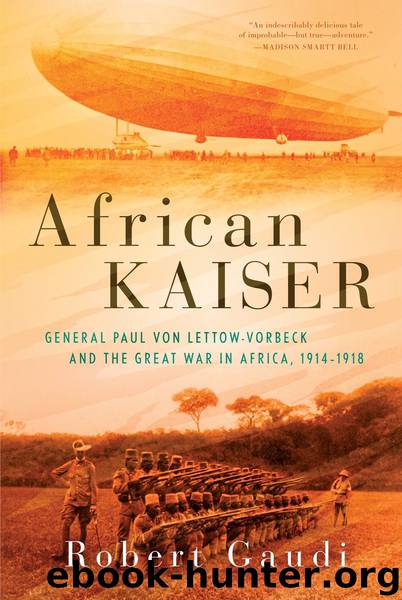African Kaiser by Robert Gaudi

Author:Robert Gaudi
Language: eng
Format: epub
Publisher: Penguin Publishing Group
Published: 2017-01-17T15:30:06+00:00
Chapter 17
THE WAR AGAINST THE RAILROAD
The British Uganda Railway ran nearly 700 miles from the Indian Ocean port of Mombasa to its terminus at Kisumu on the eastern shore of Lake Victoria—for none of this length, actually in Uganda. Its 200,000 steel ties, 1.2 million sleepers, and umpteen million stakes and metric tons of gravel were all laid in British East Africa.
At Kisumu, lake steamers would relay the weary but exhilarated passengers to Uganda on the far shore. Between ocean and lake, the railway passed over a variegated and difficult terrain, both lush and arid by turns. It crossed scrubland, impenetrable thornbush thickets, and waterless desert; traversed mountains and swamp and forested plateau; cut through valleys—including the Great Rift—all gradually uphill to the Mau Summit, where the railway builders had faced sleet and snow and massive slides of freezing mud. Then it ran steeply downhill to the green shores of the lake.
What’s left of the railway today—highways have now replaced portions of its length—remains an engineering marvel of the kind no longer possible in an age when physical reality has shrunk to the size of iPhone screens. Now neither the will nor the wallet exists for such an undertaking—but what lacks most of all is hubris, the imperial variety: Only an empire could attempt such an undertaking and succeed.
The massive construction project occupied the better part of five years, beginning in 1896. Nearly 30,000 coolies imported from India signed on as labor; 2,500 of these died alongside the tracks from accident and disease and murder and tribal warfare. But at least 28 laborers—and perhaps more than 100 natives from local villages—were killed by a pair of freakishly large man-eating lions. This occurred between March and December of 1898 at a Tsavo River crossing where the men were attempting to build a bridge. The word tsavo, as it turns out, means “slaughter” in the local Kikamba language. And though the place was pleasant enough, the river here shaded by overhanging trees, the water fast and cool, it had a bad reputation. Evil spirits supposedly lurked nearby; they were known to snatch workers from camp after dark. Certainly, many disappeared, never to be seen again.
But evil spirits, at least of the traditional sort, had nothing to do with the disappearances: It was all about the lions. Dubbed the “man-eaters of Tsavo,” these particular lions, two aggressive, maneless males, had developed an insatiable hunger for human flesh. They stalked the workers’ encampments relentlessly, always at night; fire did not deter them, nor did coolies beating on pots and pans. Leaping over protective thorn scrub palisades called “zaribas,” the lions dragged screaming coolies off to be eaten in the darkness. Once, they pulled a white overseer from a railway car and ravaged him as his friends watched, horrified. The landscape beyond the immediate construction sites was scattered with bits of half-eaten human meat, gnawed-on bones, and larger pieces—rib cages stuck with tattered bits of fabric, feet still in shoes, heads. Dozens of coolies deserted in the face of this horror.
Download
This site does not store any files on its server. We only index and link to content provided by other sites. Please contact the content providers to delete copyright contents if any and email us, we'll remove relevant links or contents immediately.
| Africa | Americas |
| Arctic & Antarctica | Asia |
| Australia & Oceania | Europe |
| Middle East | Russia |
| United States | World |
| Ancient Civilizations | Military |
| Historical Study & Educational Resources |
Goodbye Paradise(2985)
Men at Arms by Terry Pratchett(2414)
Tobruk by Peter Fitzsimons(2069)
Pirate Alley by Terry McKnight(1914)
Arabs by Eugene Rogan(1845)
Borders by unknow(1792)
Belonging by Unknown(1474)
The Biafra Story by Frederick Forsyth(1330)
It's Our Turn to Eat by Michela Wrong(1309)
Botswana--Culture Smart! by Michael Main(1242)
A Winter in Arabia by Freya Stark(1228)
Gandhi by Ramachandra Guha(1199)
Coffee: From Bean to Barista by Robert W. Thurston(1186)
Livingstone by Tim Jeal(1156)
The Falls by Unknown(1147)
The Source by James A. Michener(1140)
The Shield and The Sword by Ernle Bradford(1106)
Egyptian Mythology A Fascinating Guide to Understanding the Gods, Goddesses, Monsters, and Mortals (Greek Mythology - Norse Mythology - Egyptian Mythology) by Matt Clayton(1091)
Africa: Altered States, Ordinary Miracles by Richard Dowden(1083)
